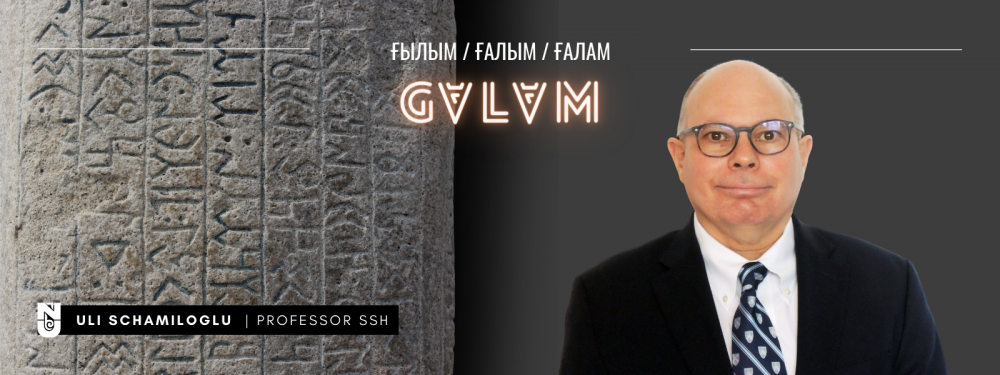“I think that situation with the Kazakh language, one generation from now, will be better”
Today we will be talking with Professor Uli Schamiloglu, Chair of the Department of Kazakh language and Turkic studies at Nazarbayev University. The professor told us why he moved to Kazakhstan, how and when he got acquainted with the Kazakh language, and what, in his opinion, prevents Kazakhstanis from mastering the state language.
Scientific interests of Professor Shamiloglu include theoretical problems of the history of the Turkic languages and cultures of the Middle East and Central Eurasia, the socio-economic history of the Middle East and Central Eurasia during the Middle Ages (in particular, the history of the Golden Horde), the history of the Turkic-Islamic civilization, and modern intellectual movements among the (Muslim) Turkic peoples. The professor is a specialist in the field of Turkic languages and philology, he has taught courses in Ottoman Turkish and Chagatay, as well as in Azerbaijani, Uzbek, Uyghur, and Kazakh languages.
Tell us a little bit about yourself. Where does your interest in Turkic languages and cultures stem from?
First of all, I was born in 1958 in New York City, my parents are of Kazan Tatar background. I grew up with Kazan Tatar as my first language, and I don’t know how I learned English, probably from television. Through a series of coincidences, I began to study Turkish when I was an undergraduate at Columbia University. My teacher was a very famous Turkologist, and by knowing him, I became interested in studying not just Turkish and Turkology, but also the history of Eurasia. Because I was interested in Turkic languages, I was trying to teach myself many things. In the 1980s I was teaching at Indiana University, and I began teaching a series of Turkic languages, including Azerbaijani, Uyghur, and Uzbek. And then later, in 1989 I went to the University of Wisconsin as an Assistant Professor until I retired from that position in 2017. I remember reading interesting texts in various Turkic languages, and teaching courses related to this.
When did you start learning the Kazakh language and why did you decide to learn it?
Some of my first introduction to Kazakh was through Istvan Mandoky Kongur, a famous Hungarian Turkologist, and his wife Aisha, she still lives in Budapest. They were two first persons I was interacting with in Kazakh, which seemed very foreign to me at that time. And I remember when I moved to the University of Wisconsin-Madison, I began to organize summer courses, and in the first year we organized summer courses in Turkic languages, we invited Kenisbay Musayev. And he explained to me some of the issues of Kazakh orthography that I couldn’t figure out by myself.
Later, with the collapse of the USSR in 1991, Kazakhstan achieved independence and started signing treaties with international powers. And the very first treaty was the protocol regarding the collection of nuclear weapons from Belarus, Ukraine and Kazakhstan and transferring them to Russia. I was invited by the State Department to be the Kazakh language expert – to make sure that the Kazakh language version says what the other language versions say. And I think that starting from that moment, I had to very quickly become professionally competent in Kazakh in terms of international documents regarding arms control, security studies, all kinds of things.
How can you describe your first impressions of studying Kazakh language? How did you practice speaking?
I was teaching Uzbek as a part of my job at the University of Wisconsin. And we were deciding what to do, and I remember that at some point I said that the Kazakh language was more important strategically, and so we started bringing in people to teach Kazakh. Later on, I had to teach it when our instructor left. From the early 1990s, I started to be engaged very deeply in written Kazakh, and later, when I started teaching, I became more confident in terms of speaking it. And of course, I started coming to Kazakhstan. Well, actually, my first time in Kazakhstan was probably in 1990, perhaps, before the collapse of the USSR. And then, I was invited in the early 2000s to give summer courses in Uralsk, and later I was invited by Eurasian National University, and al-Farabi Kazakh National University. And then, beginning in 2009, I became involved in the project of establishing a new university in Astana, which of course became Nazarbayev University. In 2010, I began actively consulting on the Nazarbayev University project. After this time I visited Nur-Sultan many times for conferences and for consulting. Then, in 2016, I received an invitation to be a visiting professor, and then I started working for Nazarbayev University.
In your opinion, what prevents people in Kazakhstan from mastering the state language? What are the challenges, and how we can overcome them?
This is a very important question. I said this many times in interviews: we need to remember that Kazakhstan is in a post-colonial situation, right? We see something similar in places like South Asia or Hongkong, for example, where English language has a very high ‘prestige’. And so I think that one thing here is that the prestige of Kazakh language has not been as high as the prestige of the Russian language. Therefore, what is happening now is a reflection of the historical situation of the 20th century. But I see that this situation is changing, it is improving now, these days we hear more Kazakh speech on the streets of Almaty and Nur-Sultan, and I actually can make these comparisons as I visited this country in the 1990s, and I work here now. I think that the situation, one generation from now, will be even better.


